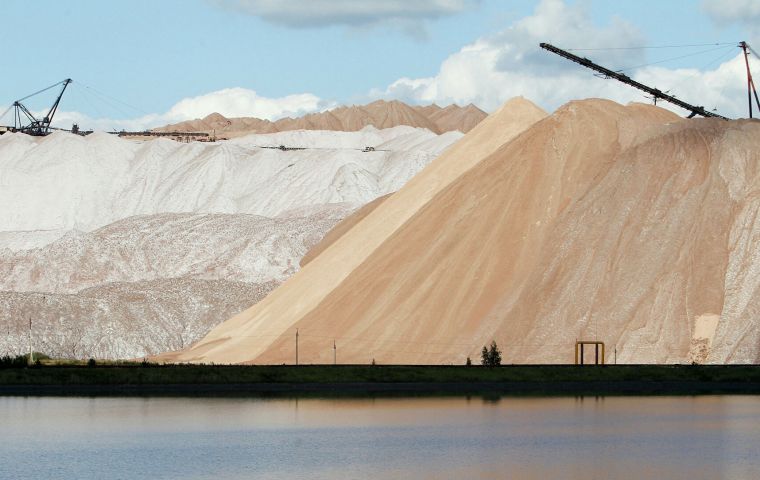MercoPress. South Atlantic News Agency
Sanctions impact on Belarus potash fertilizer and global food production
 Potash (potassium chloride, KCl) is an excellent source of soluble potassium, one of the three primary plant macronutrients along with nitrogen and phosphorus.
Potash (potassium chloride, KCl) is an excellent source of soluble potassium, one of the three primary plant macronutrients along with nitrogen and phosphorus. Some of the first consequences of the Ukraine conflict? Belarus, a close ally of Russia's Vladimir Putin, has announced that the Belarus Potash Corporation, BPC, will no longer abide by some contracts following sanctions imposed by the United States and other countries.
Potash is a fertilizer very much needed in agriculture in food production. In effect, Potash (potassium chloride, KCl) is an excellent source of soluble potassium, one of the three primary plant macronutrients along with nitrogen and phosphorus.
BPC indicated that it will look for alternatives to mitigate the sanctions’ effects on the ports through which it can continue to ship potash abroad, as the Lithuanian terminal at Klaipeda will no longer be available.
According to a report in the international outlet FertilizerDaily, the state-owned company Ukrzaliznytsia announced that it will no longer transport Belaruskali potassium chloride through Ukraine due to sanctions imposed by the US.
“This decision will affect the rail transportation of potassium chloride from Belarus to Slovakia, Hungary, Austria, Poland, the Czech Republic, Romania, CIS, and Baltic countries, in addition to the sales to the Ukrainian market,” commented the international portal.
As a result, Belarus potash has once again proven to be a significant point of contention in the international fertilizer market.
However, as Brazilian fertilizer analyst Jefferson Souza of Agrinvest Commodities explains, “a good part of these complications involving Belarusian supply has already been priced in, though I believe that future further complications can be expected,” making the possibility of lower prices in the second quarter increasingly difficult.
Souza explained that the soybeans/potash exchange rations are currently at some 27 bags in the port of Paranaguá and up to 30 bags in other terminals, when only twelve months ago it stood at 14 and a half bags. In effect the price of potash was already at a 13 year high before the sanctions.
This inevitably will have an impact of Brazil's soy acreage, the largest producer and exporter of oilseeds, and naturally in international prices that are already suffering from limited crops in Mercosur countries as a consequence of an ongoing drought.
Sanctions slapped on BPS are bound to increase dependence on other suppliers such as Canada's Nutrien Ltd, world's largest potash producer. Nutrien shares have increased 6% since sanctions on Belarus.




Top Comments
Disclaimer & comment rulesCommenting for this story is now closed.
If you have a Facebook account, become a fan and comment on our Facebook Page!